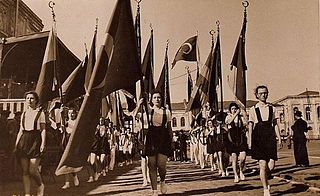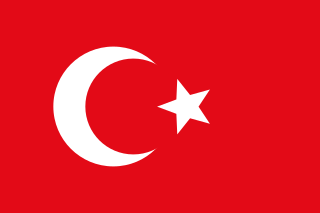
The Turkish War of Independence was a series of military campaigns and a revolution waged by the Turkish National Movement, after the Ottoman Empire was occupied and partitioned following its defeat in World War I. The conflict was between the Turkish Nationalists against Allied and separatist forces over the application of Wilsonian principles, especially self-determination, in post-World War I Anatolia and eastern Thrace. The revolution concluded the collapse of the Ottoman Empire, ending the Ottoman sultanate and the Ottoman caliphate, and establishing the Republic of Turkey. This resulted in the transfer of sovereignty from the sultan-caliph to the nation, setting the stage for nationalist revolutionary reform in Republican Turkey.

Nureddin Ibrahim Pasha, known as Nureddin İbrahim Konyar from 1934, was a Turkish military officer who served in the Ottoman Army during World War I and in the Turkish Army during the Western Front of the Turkish War of Independence. He was called Bearded Nureddin because being the only high-ranking Turkish officer during the Turkish War of Independence sporting a beard. He is known as one of the most important commanders of the war. He ordered several murders and massacres.

Hüseyin Rauf Orbay was a Turkish naval officer, statesman and diplomat of Abkhaz origin.

Ali Rıza Efendi (1839–1888) was an official, and the father of Mustafa Kemal Atatürk and the husband of Zübeyde Hanım.

The Commemoration of Atatürk, Youth and Sports Day, is an annual Turkish national holiday celebrated on May 19 to commemorate Mustafa Kemal's landing at Samsun on May 19, 1919, which is regarded as the beginning of the Turkish War of Independence in the official historiography.

Musa Kâzım Karabekir was a Turkish general and politician. He was the commander of the Eastern Army of the Ottoman Empire during the Turkish War of Independence, and fought a successful military campaign against the Armenian Democratic Republic. He was the a founder and leader of the Progressive Republican Party, the Turkish Republic's first opposition party to Atatürk, though he and his party would be purged following the Sheikh Said revolt. He was rehabilitated with İsmet İnönü's ascension to the presidency in 1938 and served as Speaker of the Grand National Assembly of Turkey before his death.

The Turkish National Movement, also known as the Anatolian Movement, the Nationalist Movement, and the Kemalists, included political and military activities of the Turkish revolutionaries that resulted in the creation and shaping of the modern Republic of Turkey, as a consequence of the defeat of the Ottoman Empire in World War I and the subsequent occupation of Constantinople and partitioning of the Ottoman Empire by the Allies under the terms of the Armistice of Mudros. The Turkish revolutionaries rebelled against this partitioning and against the Treaty of Sèvres, signed in 1920 by the Ottoman government. Most revolutionaries were former members of the Committee of Union and Progress.

The Koçgiri rebellion was a Kurdish uprising, that began in the overwhelmingly militant Koçgiri region in present-day eastern Sivas Province in February 1921. The rebellion was initially Alevi, but it succeeded in gathering support from nearby Sunni tribes. The tribal leaders had a close relationship with the Society for the Rise of Kurdistan (SAK). The rebellion was defeated in June 1921.

Çerkes Ethem, known in English as Ethem the Circassian, was a Circassian Ottoman guerilla leader, social bandit, efe and soldier. He initially gained fame for establishing the Kuva-yi Seyyare and putting down multiple large-scale rebellions and gaining key major victories against the Greek armies invading Anatolia during the Turkish War of Independence.

The Kuva-yi Milliye were irregular Turkish militia forces active in the early period of the Turkish War of Independence. These irregular forces emerged after the occupation of the parts of Turkey by the Allied forces in accordance with the Armistice of Mudros. Later, Kuva-yi Milliye were integrated to the regular army of the Grand National Assembly. Some historians call this period (1918–20) of the Turkish War of Independence the "Kuva-yi Milliye phase".
The Karboğazı ambush, also known as Battle of Karboğazı was an engagement recorded in Turkish historiography, fought between the Turkish nationalists and the French battalion on Toros Mountains during the Turkish War of Independence. Karboğazı literally means "Snow Pass".

The Government of the Grand National Assembly, self-identified as the State of Turkey or Turkey, commonly known as the Ankara Government, or archaically the Angora Government, was the provisional and revolutionary Turkish government based in Ankara during the Turkish War of Independence (1919–1923) and during the final years of the Ottoman Empire. It was led by the Turkish National Movement, as opposed to the crumbling Constantinople Government/Istanbul Government, which was led by the Ottoman Sultan.
The Raid onErbeyli was a raid conducted by the Kuva-yi Milliye. After invading Aydın and Nazilli, the Greek army was concerned about resistance movements raising in the area. The raid against the Malgaç bridge a few days ago was a good example for their feeling of unease.
The raid on Erikli was performed by members of the Kuva-yi Milliye in the Greco-Turkish War. The Malgaç attack had shocked the Greeks, so the members of the Kuva-yi Milliye planned to perform another assault.
Associations for Defence of National Rights were regional resistance organisations established in the Ottoman Empire between 1918 and 1919 that pledged themselves to the Defence of National Rights movement. They would eventually unite into the Association for the Defence of Rights of Anatolia and Rumelia in the Sivas Congress.

Museum of the Nationalist Forces in Balıkesir is a museum in Balıkesir, Turkey, dedicated to the irregular Kuva-yi Milliye formed as part of the Turkish National Movement during the Turkish War of Independence (1919–1923).

Gürdal Duyar was a Turkish sculptor who is known for his monuments to Atatürk and his busts of famous people. His art is characterized as having a modern expressionist style that is balanced with abstraction. He is considered one of the pioneers of modern figurative sculpture in Turkey. Duyar was also a painter and is noted for his sketches, but his best-known works are the public sculptures placed in Istanbul's parks and public squares.

Kuvâ-yi Seyyâre, also known as the Green Army Society or the People's Branch was a force of Circassian and Abkhazian volunteers led by Çerkes Ethem against the Allied invasion forces during the Turkish War of Independence. The group saw themselves as a force to fight against "those who caused disturbance to the greater good of Anatolia". The forces put down several rebellions and played a big role in significantly slowing down the Greek army during the Greco-Turkish War (1919-1922). In time, as Ethem's Islamic socialist views clashed with the Turkish nationalism of Mustafa Kemal's Turkish National movement, he eventually cut ties with them, and was declared a traitor due to clashes with İsmet İnönü.

Gördesli Makbule (1902–1922), also known as Makbule Efe, was a woman guerrilla from Turkey, one of the heroes of the National Liberation War. She fought as a member of Kuva-yı Milliye against the Greek invasion.

During the Turkish War of Independence the United Kingdom sought to undermine and contain the Turkish National Movement. London hoped the defeated Ottoman Empire would play a subservient role in its new Middle Eastern order drawn up over several diplomatic agreements during World War I, culminating with the Treaty of Sèvres. Another goal of the British was to prosecute Ottoman war criminals, which they thought Constantinople/Istanbul was not taking seriously.















